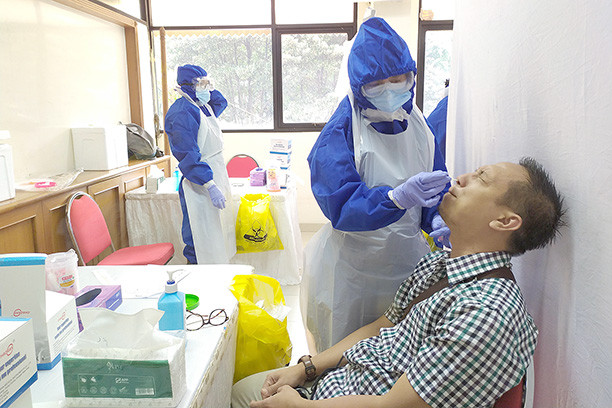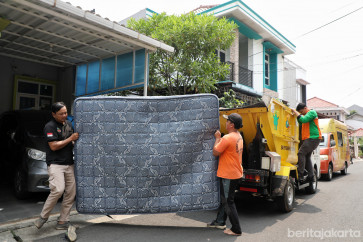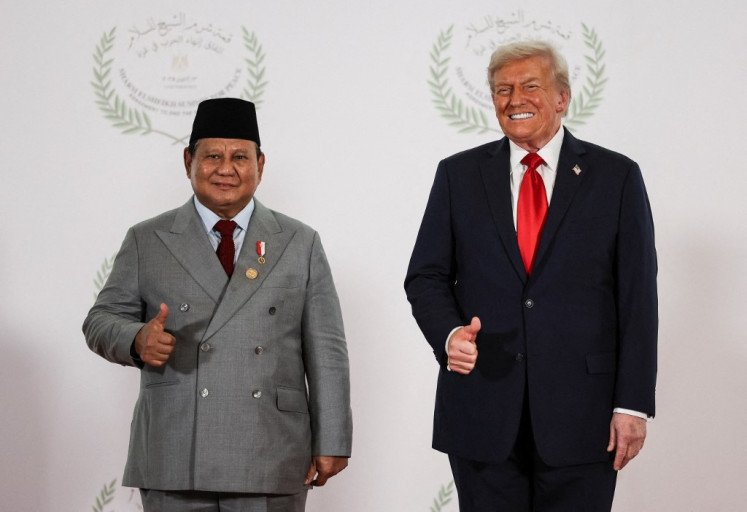Popular Reads
Top Results
Can't find what you're looking for?
View all search resultsPopular Reads
Top Results
Can't find what you're looking for?
View all search resultsWho really needs weapons?
Increasing the availability of artificial intelligence (AI) technology and programs in hospitals throughout Indonesia has the potential to protect these healthcare heroes.
Change text size
Gift Premium Articles
to Anyone
R
ecently Defense Minister Prabowo Subianto announced his intention to buy 15 second-hand Typhoon jet fighters from Austria. Prabowo stated that these planes, which each costs US$124 million, are needed to fully equip the Indonesian Military. But who are we fighting now?
As many countries strengthened themselves with the latest weapons technology in past wars, we too must equip our doctors and nurses with the best weapons we have to win this war on COVID-19.
By now we know that this is not a short battle, but a long war and our frontline heroes fight every day. They are tireless but tired. Dozens of the valiant fighters have lost their lives due to infection.
Increasing the availability of artificial intelligence (AI) technology and programs in hospitals throughout Indonesia has the potential to protect these healthcare heroes.
We often hear news reports that many patients are not completely honest about their symptoms and, in many instances, healthcare workers become exposed to the virus as a result. The latest research from the Oxford COVID-19 Evidence Service Team suggests that because healthcare workers have a greater risk of being exposed to the virus repeatedly, their infectious dose or viral load is often higher. There is also evidence that a higher viral load leads to more serious illness.
The high death rate of doctors and nurses in Indonesia and globally show how they are most at risk of becoming infected. Indonesia has a 6.5 percent death rate of healthcare workers, according to head of management at the Hasanuddin University Hospital, Irwandy. Our death rate is the highest in Asia.
This awful statistic demonstrates that we are at war and the soldiers on the frontline are doctors and nurses. We as a country have a responsibility to help and protect them. We should provide the most advanced AI technology and programs to reduce healthcare workers’ exposure and increase the care provided to patients.
So, arm our healthcare workers with AI.
Homemade AI medical technology has been applied on a small scale in Indonesia in this war on COVID-19. At the Airlangga University Hospital in Surabaya, East Java, for instance, RAISA robots deliver food to highly infectious patients to reduce interactions and the risk of transmission. RAISA was developed collaboratively by researchers at Sepuluh Nopember Institute of Technology (ITS) and the hospital. In order to reduce the risks of healthcare workers throughout the nation, we must scale-up these technologies. AI should be our national defense priority.
It will be expensive, but so are Prabowo’s fighter jets. And, healthcare workers’ lives are undeniably more precious.
AI technology has joined the frontline of many countries’ fight against this virus. In China, robots provided patients with face masks and hand sanitizer upon arrival at clinics whereas in Britain robots have been used in routine sanitation of wards.
Alibaba has also developed an AI application that compares brain and lung scans of patients. This cloud-based program is now being used in Ecuador and the Philippines and has a diagnosis accuracy rate of over 90 percent.
In Australia, a major trauma hospital in Melbourne is trialing an AI program to monitor patients at home. The program divides patients into three categories of severity. Ambulances are immediately dispatched for “red patients” whose condition is rapidly deteriorating. Nurses visit “amber patients” whose condition is worsening. Whereas the program monitors the vital signs of “green” patients whose illness is less severe.
In Brisbane, Queensland, the major hospital has implemented telepresence robots in its COVID-19 ward to facilitate doctor-patient communication and safely connect patients with their families and friends through video calls. Using this technology can make patients less anxious, which according to University College London and King’s College researchers is crucial for their body to fight the virus.
There have also been many tragic stories in Indonesia and around the world of patients dying alone and families unable to say goodbye. AI can bring them together. In many religions, followers want to seek guidance while they are sick, and especially if their condition worsens. With telepresence technology, imams, priests and other trusted religious leaders can carry out pastoral care.
We have a responsibility to care for those who care for us – to protect doctors and nurses. AI is an important tool in our armory to fight COVID-19 and to offer safe and holistic care to patients.
Every day we read of new record case numbers and that this virus has taken the lives of our fellow citizens. For every 100 deaths, six are healthcare workers. We are losing those who we need most at this critical moment.
The Indonesian government should focus on the war we are currently in. Although researching and implementing AI in hospitals throughout Indonesia will be expensive, this technology can give hope and much needed support to our doctors and nurses.
While Prabowo emphasizes the need for weapons to protect our country, our healthcare worker heroes are on the battlefield. Other countries are building stronger shields to safeguard their doctors and nurses. Indonesia has a choice to recruit AI to support our hospitals or to persist with the current strategy and resources.
***
The writer is contributor to a number of Indonesian newspapers, now studying at RMIT English Worldwide in Melbourne, Australia.










